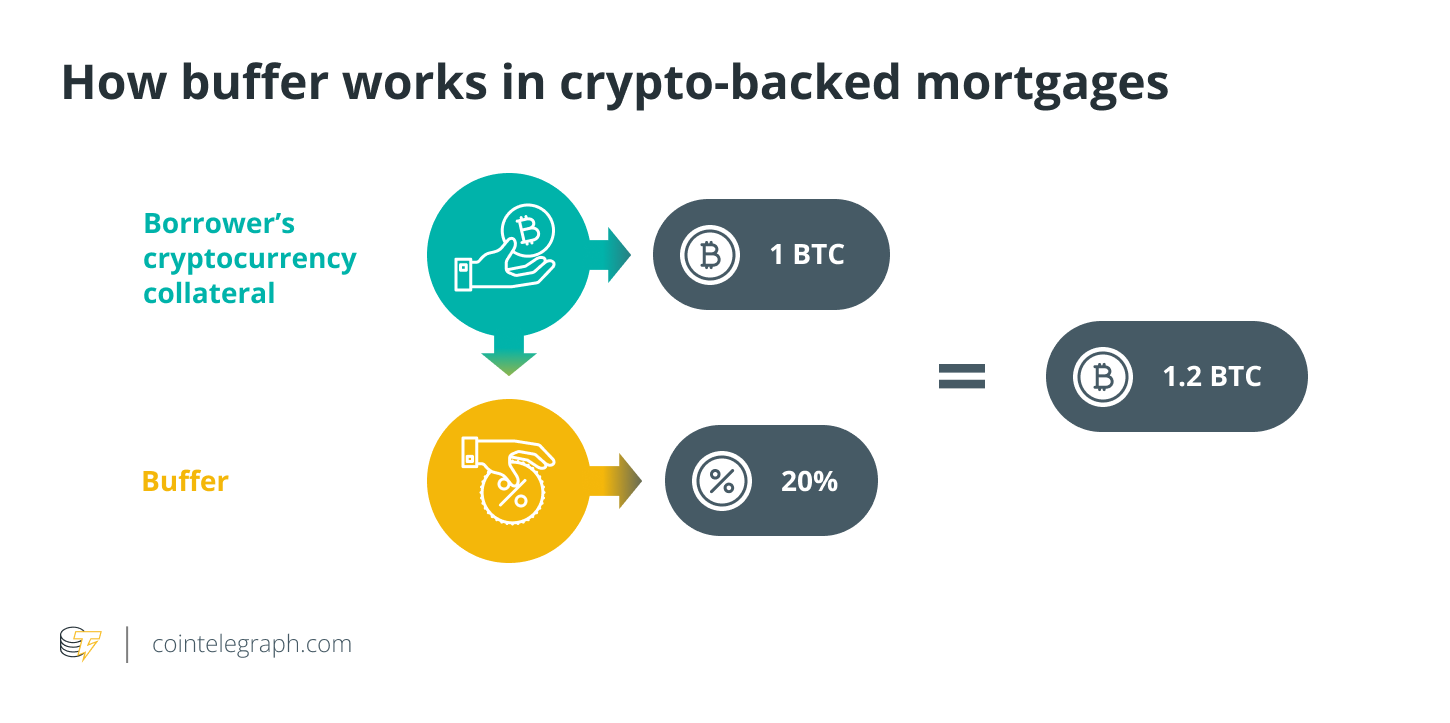
What are crypto-backed mortgages, and how do they work?

Crypto-backed mortgages involve using cryptocurrency holdings as collateral to secure loans, offering benefits like access to liquidity without selling assets.
Risks concerned with crypto-backed mortgages
The volatility of crypto collateral, uncertain regulations, security risks and the need to evaluate risk-reward ratios all highlight the complexity of considering crypto-backed mortgages.
The volatility of cryptocurrencies, which can cause significant swings in the value of the collateral during the loan term, is one fundamental cause for concern. These market fluctuations could result in margin calls, forcing borrowers to increase their collateral or risk liquidation.
Additionally, the regulatory framework for financial products based on cryptocurrencies is still in its infancy, with different implications depending on the jurisdiction. This uncertainty might impact the stability and legality of these agreements.
Moreover, security breaches could endanger the security of the digital assets used as collateral. The borrower must fully understand the terms and conditions, including the interest rates, costs and potential tax repercussions.
Individuals should consider the total risk-to-reward ratio while determining whether obtaining a mortgage is a wise decision given their current situation. The risk-reward ratio compares an investment’s potential profit against its potential loss. It is determined by dividing the expected gain by the expected loss, and it aids investors in determining if a business opportunity is worthwhile to pursue based on the ratio between prospective returns and potential risks.
Crypto-backed mortgage benefits
Crypto-backed loans provide cryptocurrency holders access to assets without selling, avoiding taxes and enabling traditional investments. They also promote financial inclusion and control over exposure to digital assets.
Crypto collateralized loans enable cryptocurrency owners to access their digital assets without selling them, potentially saving them from paying capital gains tax. These mortgages also offer a way to get traditional financing, making investing in real estate or other businesses possible.
Financing options may be available through cryptocurrency-backed mortgages for those without access to conventional banking institutions, promoting financial inclusion. Borrowers can use these mortgages to control their exposure to cryptocurrencies and possibly hedge against significant price changes.
Moreover, borrowers continue to be exposed to possible cryptocurrency value growth while using funds for useful purposes. Additionally, by bridging the traditional financial and digital worlds, these mortgages increase the utility of cryptocurrencies in regular transactions.
Cryptocurrency owners can diversify their investment portfolio by securing traditional finance for projects like real estate with their digital assets. Borrowers can utilize their assets directly as collateral instead of selling cryptocurrency on exchanges, avoiding potential trading complexities.
How to buy a house using crypto-backed loans
People who want to buy a house using crypto-backed loans should research lending platforms, choose their collateral, submit loan applications and consider potential legal ramifications.
To buy a house using crypto-backed loans, an individual must look into reputable lending companies that provide such mortgages. After deciding on an appropriate platform, the user can choose a cryptocurrency for collateral.
The next step is to file a loan application via the platform of choice, including necessary information, such as ownership evidence for the collateral. The lending institution then assesses the collateral’s worth to calculate the practical loan amount.
Once the lender approves, the borrower reads and accepts the loan’s terms, which cover items like interest rates, payback terms and collateral requirements. Following acceptance, the borrower receives the loan amount (in fiat money, cryptocurrencies or stablecoins), which can subsequently be used to buy a property.
To reduce the risks related to changes in the value of the collateral, it is essential to be diligent in monitoring potential market volatility. Furthermore, to ensure compliance with applicable laws in their area, individuals should also consider the legal and tax implications of using cryptocurrencies for real estate transactions.
Crypto-backed mortgage products
Crypto-backed mortgage products, such as crypto collateral loans and decentralized finance (DeFi) mortgages, offer cryptocurrency owners an opportunity to access liquidity without selling their digital assets.
Examples of crypto-backed mortgage products include:
Crypto collateral loans
Borrowers use their cryptocurrency holdings as security to obtain a loan. The worth of the collateralized assets establishes the loan’s value. In accordance with the nature of the collateral, certain crypto-backed mortgages permit borrowers to pay back the loan plus interest in cryptocurrency. However, the lender may sell the collateral if the borrower defaults.
Stablecoin mortgages
Borrowers pledge stablecoins as collateral, which are digital currencies anchored to a stable asset like a fiat currency. This preserves access to funds while reducing the volatility linked to conventional cryptocurrencies.
DeFi mortgages
DeFi mortgages are issued using blockchain technology and smart contracts. DeFi protocols operate autonomously on the blockchain, enabling trustless borrowing and lending without intermediaries. For instance, platforms like Aave and Compound allow users to pledge their crypto assets as loan collateral.
Cross-collateralization
To secure a loan, borrowers may utilize a variety of cryptocurrencies as security. Distributing collateral among several assets can offer flexibility and reduce risks.
Fractional ownership mortgages
Using blockchain technology, borrowers can tokenize their real estate and offer fractional ownership, giving investors a new option to get involved in real estate ventures.
How do crypto mortgages work?
Crypto mortgages entail utilizing cryptocurrency holdings as security to bind a conventional mortgage or loan.
The procedure to obtain a crypto-backed mortgage starts with the borrower giving their cryptocurrency to the lender as security, with the lender calculating the maximum loan amount depending on the value of the collateral.
The acceptability of the cryptocurrency is assessed before interest rates, payback terms and term length are decided. The borrower deposits the agreed cryptocurrency sum into the lender’s escrow account once the terms are agreed. In the escrow account, a third party keeps and manages funds, property or documents on behalf of both parties to a transaction until certain criteria are satisfied.
This collateral is kept locked up for the duration of the loan, and to control volatility risks, borrowers frequently need to have a specific buffer between the value of the collateral and the loan balance.
Payments are typically made in fiat money. After repayment is complete, the borrower receives the collateral back. However, a margin call (demand for additional collateral due to fluctuation in collateral value) might happen if the value of the cryptocurrency falls dramatically, in which case the borrower would have to restore the necessary margin.
When referring to loans with cryptocurrency as collateral, a buffer is a predetermined percentage difference between the loan balance and the collateral value (cryptocurrency). For instance, if a borrower’s cryptocurrency collateral is valued at 1 BTC and the lender stipulates a 20% buffer, the borrower needs to provide the collateral equivalent to 1.2 BTC (1 BTC 20% of 1 BTC), effectively creating a buffer against potential volatility risks throughout the loan tenure.

This buffer serves as a safety cushion for both the borrower and the lender by preventing changes in the value of the cryptocurrency from instantly resulting in margin calls or the liquidation of collateral.
Crypto-backed mortgages, explained
Using cryptocurrencies like Bitcoin (BTC), Ether (ETH) or other digital assets as collateral to get a standard mortgage loan is known as a crypto-backed mortgage.
The idea of using cryptocurrencies as loan collateral surfaced as the cryptocurrency market gained popularity. The extreme volatility and potential for significant value appreciation in the crypto market inspired the notion of leveraging these digital assets to secure conventional loans.
In crypto-backed mortgages, the loan amount is based on the cryptocurrency’s value, and the digital assets are kept as security until the loan is paid back. To enable safe and open transactions, these organizations use blockchain technology and smart contracts to facilitate cryptocurrency-collateralized loans, which utilize digital assets as security to obtain loans.
When a decentralized lending platform called Salt Lending was introduced in 2018, it became the first notable instance of cryptocurrencies-backed mortgages. Borrowers could use their cryptocurrency holdings as security for loans through Salt lending. Though the idea ran into legal and regulatory issues, the business later altered its offers.
Types of crypto-backed mortgages
The common type of crypto-backed mortgages include:
- Purchase mortgages: These mortgages are used for real estate financing and are secured using cryptocurrency as a security by borrowers.
- Cash-out refinancing: Homeowners with existing mortgages may refinance their properties using their cryptocurrency holdings as security to acquire funds for various uses.
- Bridge loans: Borrowers use cryptocurrency collateral to secure a short-term bridge loan to cover the gap between buying a new property and selling an existing one.
Go to Source
Author: Jagjit Singh








